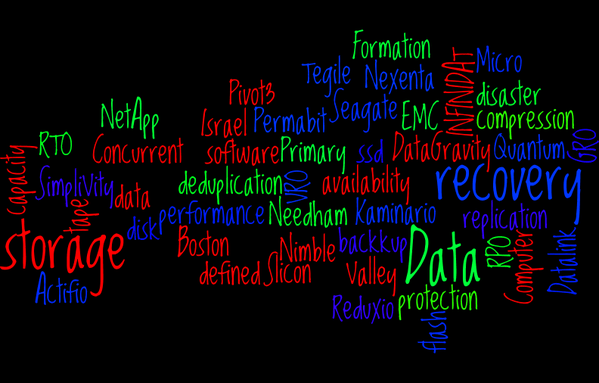So, I spent yesterday at the Needham Next-Gen Storage and Networking Conference. First, it was a great day. The Needham folks, especially Richard Kugele, created a fabulous opportunity to listen and speak about the storage market, technology and products. I spent all my time in the storage track, but can only imagine that the networking track was as insightful.
I wanted to point out some of my observations from the conference. I wont call out any vendor in particular (other than it was good to catch up with my friend Rob Cummins from Tegile, its been too long), to make sure if there was anything that was stated in any one’s talk that was not public yet, it stays that way, but I don't think there was.
As one would imagine, the conversations centered around, flash, hybrid, converged, hyperconverged, cloud, software defined and storage efficiency.
The conversations around flash were interesting. There is the ‘all flash’ vs ‘hybrid’ approach and each vendor stating that one way was better than the other (except Tegile who does both), depending on what product you had or sold. While I understand the “all flash” story, and having been a big part of the marketing message when I was at IBM for the “all flash” system when they acquired TMS, the reality is, hybrid IS the most logical approach. And when a system is architected correctly, one can achieve the performance of an all flash array with a hybrid system for less cost, check out INFINIDAT.
I saw a lot of slides on the ‘evolution’ of systems from open to converged to hyperconverged or Converged 2.0 to Converged 3.0. Good stories and they all make sense to me. Of course while each of these vendors sells hardware, they all also claim to be software companies and are ‘software defined’ solutions. In the end, there is really no real 'definition' of 'software-defined' making the term much less important these days. The reality is, to be truly 'software defined' your platform must be OPEN and allow others vendors to write to the platform in order to take advantage of it. None of the vendors had this, or if they did, they didn’t talk about the openness or having other solutions take advantage of their platform.
When it came to storage efficiency, it was really about capabilities such as compression and deduplication being tables takes for storage today in order to help control costs. My opinion on this is somewhat varied. The ‘cost’ for these capabilities is both raw dollar costs as well as the cost of running these features from a performance perspective. And no matter what anyone tells you it is not negligible, not today. My belief is that IT practitioners need to set cost criteria and performance criteria that they need to achieve. How you get there is not really relevant, meeting the SLAs are what is relevant.
A key message that came through loud and clear from EVERY vendor is how IT will not need to have backup software or backup hardware in the future (throw out your NetBackup, throw out your Data Domain) because all these new systems take data protection into account. (Come on, we have been talking about the death of backup for decades, could it really happen? Highly unlikely!)
At the end of the day one thing struck me, EVERY vendor had some major wins, against incumbent player in the market, with large enterprise clients buying into their solution. EVERY vendor. This tells me a couple of things. First, and I have to preface this with I am a HUGE Simon Sinek fan, is that “people don’t buy what you do, they buy why you do it”, meaning, it is more about the 'why' behind what the product stands for, than it is about the technology itself. It also tells me a lot about the people in our industry and makes me feel proud to be in this industry. Second, is that it tells me that if you have passion about the technology you are building, and encourage others to believe what you believe in solving a problem, then you can be very successful no matter the solution.
